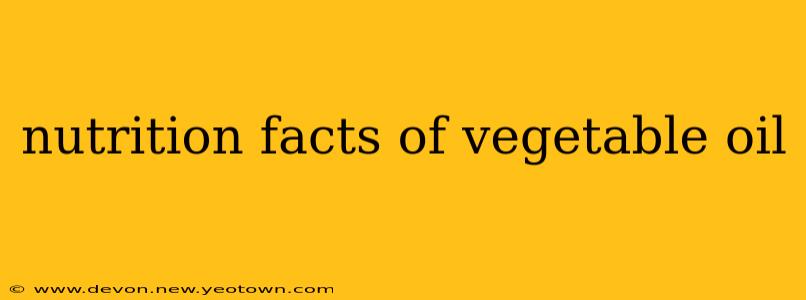Vegetable oil, a kitchen staple in countless homes worldwide, often sits quietly on the shelf, its nutritional profile largely overlooked. But this unassuming liquid gold plays a significant role in our diets, and understanding its nutritional facts is key to making informed choices about our health. This isn't just about calories; we'll delve into the nuances of its fatty acid composition, potential benefits, and areas of concern. Let's embark on this culinary journey together.
What are the main components of vegetable oil nutrition?
The nutritional makeup of vegetable oil varies depending on the source (e.g., soybean, canola, sunflower). However, they share some common ground. Primarily, vegetable oils are composed almost entirely of fat – about 120 calories per tablespoon, with negligible amounts of protein and carbohydrates. The type of fat, however, is where the crucial differences lie. Most vegetable oils are rich in unsaturated fats, including monounsaturated and polyunsaturated fatty acids. These are generally considered "good" fats, playing a beneficial role in heart health when replacing saturated and trans fats in the diet. However, the specific ratio of these fatty acids differs between oil types. For instance, olive oil is higher in monounsaturated fats, while soybean oil contains more polyunsaturated fats.
What are the health benefits of vegetable oil?
The health benefits of vegetable oil primarily stem from its unsaturated fat content. These fats can contribute to:
-
Lowering LDL ("bad") cholesterol: Replacing saturated fats with unsaturated fats from vegetable oils can help reduce levels of LDL cholesterol, a significant risk factor for heart disease.
-
Raising HDL ("good") cholesterol: Some vegetable oils, particularly those rich in monounsaturated fats, may help increase levels of HDL cholesterol, which is associated with a reduced risk of heart disease.
-
Providing essential fatty acids: Certain vegetable oils, like flaxseed and soybean oil, are good sources of omega-3 and omega-6 fatty acids, essential fats our bodies cannot produce but need for various bodily functions.
-
Supporting vitamin E intake: Many vegetable oils contain vitamin E, a potent antioxidant that protects cells from damage caused by free radicals.
Is vegetable oil good for cooking?
The suitability of vegetable oil for cooking depends on its smoke point – the temperature at which it starts to break down and produce harmful compounds. Oils with higher smoke points, like avocado and refined coconut oil, are better suited for high-heat cooking methods like frying. Oils with lower smoke points, such as flaxseed oil, are best used in low-heat applications like salad dressings. It's crucial to choose the right oil for the cooking method to maintain its nutritional value and avoid the formation of harmful compounds.
Does vegetable oil contain cholesterol?
No, vegetable oils do not contain cholesterol. Cholesterol is only found in animal products. This is one of the key reasons why vegetable oils are often recommended as a healthier alternative to butter or animal fats.
What are the potential downsides of vegetable oil consumption?
While generally considered healthy, excessive consumption of vegetable oil can contribute to weight gain due to its high calorie content. Additionally, some concerns exist regarding the potential negative impact of industrial processing on the nutritional value and stability of certain vegetable oils. The level of processing, particularly regarding high heat and chemical treatments, can impact the oil's nutritional profile and potential oxidation leading to the formation of potentially harmful compounds. Further research is needed to fully understand the long-term effects of these processed oils.
What types of vegetable oil are the healthiest?
The "healthiest" vegetable oil depends on individual needs and preferences. However, options often cited as beneficial include olive oil (rich in monounsaturated fats), avocado oil (high smoke point and rich in monounsaturated fats), and oils containing higher levels of omega-3 fatty acids like flaxseed oil (though best used in lower-heat applications). Variety is key, so incorporating different types of vegetable oils into your diet can provide a broader range of nutrients.
This exploration into the nutritional world of vegetable oil highlights the importance of understanding its diverse composition and considering its potential impact on our health. Remember, moderation and a balanced diet are key to reaping its benefits and mitigating any potential downsides. Always consult with a healthcare professional or registered dietitian for personalized dietary advice.

